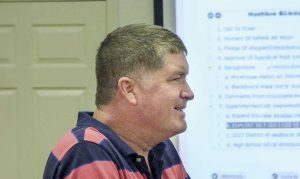A few years ago, I was sick. Very sick. My wife and I were visiting her parents in East Tennessee. Cindy’s mother was in the hospital with what turned out to be the H1N1 virus. Within a few days she and I, and other members of the family, were infected. I read somewhere that the H1N1 virus is related to the swine flu pandemic of 1918-19. Worldwide, between 50 and 100 million people died of that affliction.
So it was that Cindy was downstairs in her parents’ house desperately sick and barely able to move while I was upstairs in the same condition. It was the sickest either of us had ever been. I didn’t know that one could be that ill and recover. In fact, I considered that I might die of whatever this was. Which led me to think about a man I had never met.
Roy Harrison Luster was a young man when he met and married Pashia Tunnell. Life appeared to be good and the future was bright. The First World War was over and the Great Depression had not yet hit. The young couple had a daughter. Then another. Then a third daughter followed. All these girls came fairly close to each other. And then Roy contracted typhoid fever.
Typhoid fever is contracted by ingesting contaminated food or water. Around 3-5 percent of typhoid patients become carriers of the disease. In the 1920s, 20 percent of people who caught typhoid fever died. Even today, some 21,000,000 people worldwide contract the disease each year with 200,000 dying. The disease in the United States, due to clean water, sanitation, and antibiotics, has been virtually eliminated. But in the late 1920s, that wasn’t the case.
I don’t know what went through Roy Luster’s mind as he lay suffering the ravages of the fever. Was he afraid? Was he worried for his wife? For his three infant/toddler daughters? Severe headaches, vomiting, diarrhea, loss of appetite, dehydration, lethargy — all would have been the results of his fever. When did he know he wouldn’t recover? Did he even realize that he was dying? But die he did … a brutal, unforgiving, terrible death … at the ripe old age of 24.
As I lay in the bed that day just hoping I would have the strength and the time to make it to the bathroom, as I heard the suffering of my wife downstairs (neither of us had the ability to help the other), as I thought of my mother-in-law suffering the same fate in the hospital bed, I came to the realization that we all, to some extent, die alone.
Roy Luster, even with family in the room, died alone. With him died his dreams of seeing his girls grow up, of walking them down the aisle, and of holding his grandchildren, and enjoying his retirement days with his wife. He would never see what his daughters and grandchildren would become.
Roy Harrison Luster was my grandfather. I have a copy of the only known photograph of him taken in his 20s. Sometimes I look to see if there is any resemblance. I do carry his genes, after all. I look at my sons, and now my own grandchildren, searching for some sign of him. I know the signs are there, obscured by years and generations.
My grandmother would remarry and Charles Duckett would be my grandfather — the only maternal grandfather I would know. He would be the one to take me fishing and let me dig for worms in his backyard. He would be the one who would pick me up after Marine Corps boot camp and be the family member who first saw me in uniform. He would be the man who shattered my heart when he died in 1973. He was a great Grandpa to me. There are no regrets.
But I do wonder from time to time about the grandfather I never met. What were his likes and dislikes? Did he have a sense of humor? What did he do for a living? For recreation? Did he have skills, a hobby? What was his education, if any? Was he in the military? Did he go to church? Was he a Methodist, a Baptist, or something else?
It’s too late to know the answers. My grandmother died in 1985 and I never asked her any of these questions.
Still, each year during the days before and after Father’s Day, as I did during those days of H1N1, I think about him. It’s been 89 years since he died of typhoid fever, a condition he would have survived if he had lived today. All these years later, I remember a man I never met.
[David Epps is the pastor of the Cathedral of Christ the King, Sharpsburg, GA between Newnan and Peachtree City (www.ctkcec.org). He is the bishop of the Charismatic Episcopal Diocese of the Mid-South which consists of Georgia and Tennessee (www.midsouthdiocese.org) and the Associate Endorser for the Department of the Armed Forces, U. S. Military Chaplains, ICCEC. He may contacted at [email protected].]









Leave a Comment
You must be logged in to post a comment.